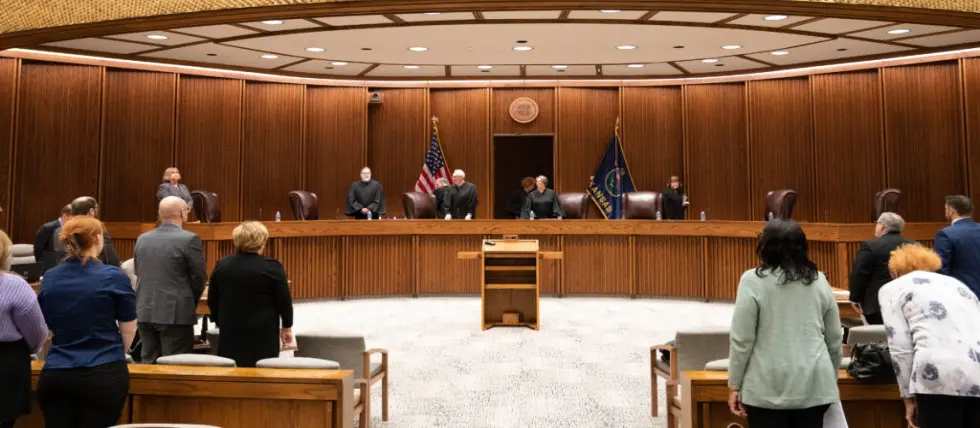Kansas Supreme Court Hears Arguments in Social Casino Debate
The Kansas Supreme Court is currently deliberating on a complex case involving the classification of certain gaming devices, brought forward by gaming company Pace-O-Matic.

The company seeks legal clarity on distinctions between gambling, games of chance, and skill-based games, a topic that is currently being discussed in several states and at the federal level. At the center of the debate is the company's game, Dragon's Ascent, which Pace-O-Matic introduced in Kansas in 2019.
Following the game's release, the Kansas Racing and Gaming Commission (KRGC) issued a letter in August 2020 stating that Dragon's Ascent involved a significant element of chance, which, according to Kansas law, would qualify it as an illegal gambling device. This communication was shared with members of the Kansas Sheriffs' Association and the Kansas District Attorneys Association, advising caution in allowing the game's use.
Related: Amazon Faces Lawsuit over Link to Casino AppsThe KRGC letter triggered concerns among local business owners who feared potential law enforcement action against establishments featuring Dragon's Ascent. This uncertainty led some businesses to avoid installing the game, resulting in lost revenue and a decline in business for both operators and the game's developers.
Pace-O-Matic's attorney, Tom Hamilton, has argued that the lack of regulatory clarity around Dragon's Ascent created hesitation among operators. Businesses opted not to host the game to avoid possible legal repercussions, which has negatively impacted the game manufacturer's revenue.
In response to the KRGC's stance, Pace-O-Matic filed a lawsuit against the state of Kansas, initiating a legal debate that has now reached the Kansas Supreme Court. Central to the case is the question of whether Dragon's Ascent qualifies as a game of skill or chance, which would determine its legality under Kansas state gambling laws.
The state's attorneys argued that Kansas has yet to take an official position on Dragon's Ascent, contending that the lawsuit should be dismissed on the grounds that Pace-O-Matic lacks legal standing. Deputy Solicitor General Dwight Carswell argued that the game continues to be available in Kansas, with law enforcement neither seizing game devices nor pursuing bars hosting them.
One of the key questions facing the Kansas Supreme Court is whether Dragon's Ascent meets the criteria for a skill-based game under Kansas law. The legal definition of gambling in Kansas relies heavily on the concept of "chance," which appears nine times in state statutes defining gambling activities.
This wording has raised questions among legal experts and gaming operators alike about how games like Dragon's Ascent should be classified. Unlike traditional slot machines, which are closely regulated to control payout frequencies, Dragon's Ascent does not have built-in restrictions on winnings. The game's design includes elements such as color matching and adjusting shot power, which Pace-O-Matic contends are strictly skill-based features that players can develop over time.
More Business News
 Business
Business
Fitch Analysts Paint Potentially Dire Picture of US Casino Operators' Future in Macau
Apr 25, 2025A Heated Topic
The broader debate about games like Dragon's Ascent is part of an ongoing national conversation surrounding social casinos and sweepstakes-based gaming. During a recent five-part educational series on sweepstakes casinos organized by the Indian Gaming Association, representatives from the American Gaming Association (AGA) highlighted the uncertainties surrounding sweepstakes gaming.
Chris Cylke, AGA's Senior Vice President for Government Relations, noted that the legal standing of sweepstakes casinos remains "murky" despite operators' assurances of their legality. According to feedback Cylke received from AGA members, the uncertain regulatory status has deterred licensed casinos from entering the sweepstakes gaming market, with operators hesitant to risk their licenses without more definitive legal clarity.
The discussion highlighted comparisons to popular promotions like McDonald's Monopoly game, which runs as a sweepstakes without legal complications. However, Cylke dismissed the notion that sweepstakes casino games could operate with similar ease. He stated that while McDonald's is likely on stable legal ground, the transition to online gaming changes the legal landscape considerably, making regulatory assessments more complex.
Jason Giles, Executive Director of the Indian Gaming Association, offered insight into the lack of regulatory urgency surrounding sweepstakes casinos, suggesting that the new format is not currently a priority for most state attorneys general. Giles attributed the limited interest in regulating sweepstakes gaming to the perception that it lacks appeal and urgency for those pursuing higher office.
Giles also suggested that the current sweepstakes casino landscape in the US resembles the early days of the daily fantasy sports industry, where operators launched platforms amid limited regulatory oversight. The outcome of the Kansas Supreme Court case is likely to provide some clarity on these issues. It could also potentially setting precedents for how games that incorporate both chance and skill are classified and regulated across the country.
RELATED TOPICS: Business
Most Read
Must Read
 Interviews
Interviews
Sweepstakes Casinos: Thriving in an Ever-Changing Industry – Interview with Attorney Stephen C. Piepgrass
Feb 17, 2025 Interviews
Interviews






Review this New Post
Leave a Comment
User Comments
Comments for Kansas Supreme Court Hears Arguments in Social Casino Debate